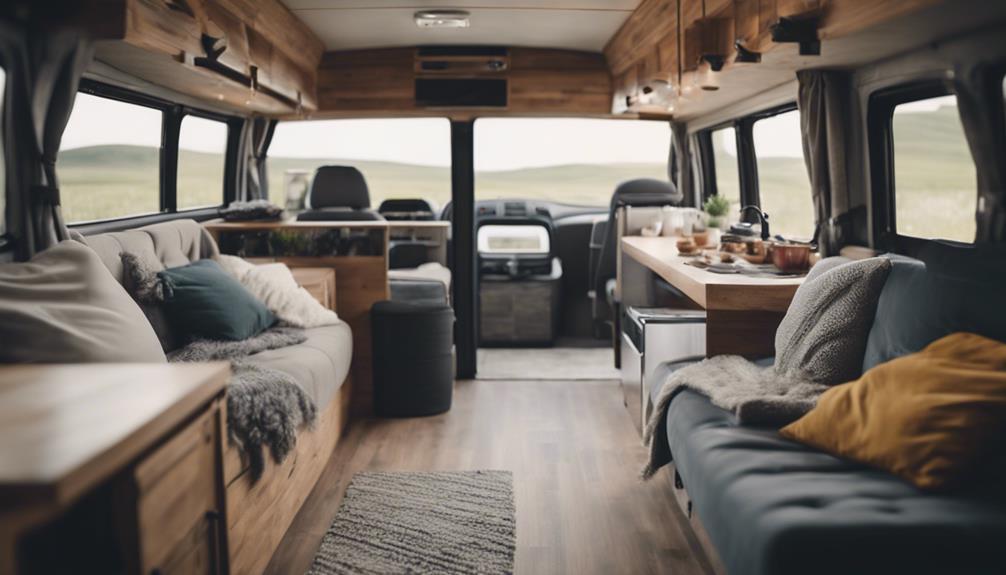When you're looking for the best vans for camper conversion, consider the Ford Transit, Mercedes Sprinter, and Ram ProMaster. The Ford Transit offers great fuel efficiency and versatile sizes, making it perfect for different needs. The Mercedes Sprinter's spacious interior is ideal for customization, while the Ram ProMaster is budget-friendly with ample interior space. Each van has its own maintenance cost and resale value, so think about your long-term goals. No matter which one you choose, you're setting the stage for adventure. There's plenty more to explore about each option and what fits you best.
Introduction
When you're diving into the world of camper conversions, choosing the right van can make all the difference in your adventure. The best vans for camper conversions come with a variety of features that cater to different needs and preferences.
For instance, the Ford Transit stands out for its excellent fuel efficiency and multiple configurations, making it ideal for both seasoned van lifers and newcomers alike.
On the other hand, the Mercedes Sprinter is known for its robust build quality and spacious interior, which can accommodate various layouts, perfect for those who love to customize their space.
If you're looking for a budget-friendly option, the Ram ProMaster offers a wide interior and front-wheel drive, making it easy to navigate urban environments while providing ample room for your camper setup.
Each of these vans has unique features that align with different lifestyles. Whether you're planning long trips or short getaways, understanding these options will help you select the perfect van for your camper van conversions and enhance your van life experience.
Background Information
When you consider camper conversions, it's important to understand the history behind them and how they've evolved over time.
You'll notice the emergence of electric camper vans, which are changing the game for eco-conscious travelers.
This background sets the stage for exploring the best van options for your next adventure.
Van Conversion History Overview
The history of van conversions reflects a growing desire for adventure and flexibility, evolving from the counterculture movements of the 1960s to today's remote work lifestyle.
Back then, the VW Bus became an iconic symbol of van life, embodying the spirit of freedom and exploration. As people sought to escape traditional norms, camper van conversions emerged, allowing travelers to hit the open road with comfort and style.
Fast forward to the 2020s, the rise of remote work has ignited renewed interest in camper van conversions. Individuals are now embracing flexible living, transforming vans into mobile offices and homes.
Modern advancements in materials and technology have led to efficient designs that prioritize comfort and usability, making it easier than ever to convert a van into a cozy space.
Today, an online community thrives, filled with resources, forums, and social media platforms where enthusiasts share tips and experiences related to van conversion history.
This vibrant network inspires countless people to undertake their own camper van conversion journeys, proving that the allure of adventure is alive and well in the world of flexible living.
Emergence of Electric Camper Vans
A growing number of travelers are turning to electric camper vans as a sustainable and eco-friendly option for their adventures on the road. With models like the Mercedes eSprinter and Ford E-Transit, you can enjoy zero-emission driving while embracing the freedom of the open road.
These electric camper vans come equipped with advanced battery systems, providing ranges of approximately 100 to 200 miles on a single charge, perfect for short to medium trips.
The integration of solar panels is gaining popularity in these conversions, allowing you to venture off-grid and extend your travels without needing frequent charging. This capability is a game-changer for adventurous travelers who want to explore remote locations.
Plus, government incentives and tax credits for electric vehicles make these eco-friendly options more accessible, encouraging you to contemplate an electric camper van for your next journey.
Emergence of Solar-Powered Vans

Solar-powered vans are revolutionizing the way you think about camper conversions.
By integrating eco-friendly energy solutions, these vehicles provide a sustainable power source for your off-grid adventures.
With innovations in electric van conversion, you can enjoy modern comforts while minimizing your environmental footprint.
Electric Van Conversion Innovations
Emerging solar-powered vans are transforming camper conversions by offering energy independence and reducing reliance on traditional fuel sources. With the integration of solar panels on roofs, these vans can harness sunlight, providing power for essential appliances and lighting. Systems typically range from 100W to 600W, ensuring you won't drain the vehicle's battery.
Modern electric vans, like the Ford E-Transit and Mercedes eSprinter, present excellent options for full electric conversions, catering to those seeking eco-friendly travel solutions. Innovations in battery technology, particularly lithium-ion batteries, enhance energy storage capacity and efficiency, making longer trips and comfortable living conditions possible in your converted van.
The growing availability of DIY solar kits and modular components allows you to customize your solar setup easily. This versatility means you can tailor your camper conversion to fit your needs, whether you're planning a weekend getaway or a long-term off-grid adventure.
With solar-powered vans, you can embrace a lifestyle that prioritizes sustainability while enjoying the freedom of the open road. So, consider these innovations as you plan your next camper conversion project!
Eco-Friendly Energy Solutions
As electric vans gain popularity, eco-friendly energy solutions like solar power are becoming integral to camper conversions, allowing travelers to harness renewable energy on the road.
Solar-powered vans are revolutionizing the way you travel, letting you reduce reliance on fossil fuels. A typical solar panel system for camper vans can generate between 200 to 400 watts, ample power for essentials like refrigerators, lights, and charging devices.
Many van lifers pair solar setups with lithium-ion batteries, which offer higher energy density and longer lifespans than traditional lead-acid batteries. This combination not only supports your camper's energy needs but can also cut energy expenses considerably—some users report saving up to 50% during extended trips.
The growing trend in solar-powered vans has also led to a surge in DIY kits, making it easier for enthusiasts to integrate renewable energy solutions into their camper conversions.
With these eco-friendly travel options, you can enjoy your adventures while minimizing your environmental impact, embracing a sustainable lifestyle on the go.
Whether you're a seasoned van lifer or a newcomer, incorporating solar power into your camper van is a smart choice for an eco-conscious journey.
Cost-Benefit Evaluation
When evaluating the cost-benefit of converting a van, you'll want to weigh the advantages and disadvantages of each model.
Industry experts often provide insights on performance and long-term value, which can guide your decision.
Comparing these factors will help you make an informed choice that suits your budget and lifestyle.
Advantages and Disadvantages
Evaluating the advantages and disadvantages of each van for camper conversion reveals important cost-benefit considerations that can greatly impact your overall investment.
The Mercedes Sprinter offers a high resale value and extensive aftermarket parts availability, making it a solid choice for long-term travelers, despite its higher upfront cost. However, you'll face maintenance costs that can range from $3,000 to $5,000 over five years.
On the other hand, the Ford Transit presents an affordable option at around $52,000, boasting better fuel economy and a variety of sizes. This versatility can lead to lower long-term ownership costs, making it a practical choice for many.
The Ram ProMaster stands out as the most budget-friendly option, starting at approximately $50,000. While it may seem appealing, be aware that it often experiences higher depreciation rates and lower fuel efficiency, which can negatively affect its long-term value. Maintenance costs are generally lower, ranging from $2,000 to $3,500, but the impact on resale value should be factored into your decision.
Ultimately, weighing these advantages and disadvantages will help you choose the right van for your camper conversion needs.
Industry Expert Insights
Industry experts emphasize the importance of understanding the long-term cost implications of each van model when considering a camper conversion.
The Ford Transit is a popular choice for those seeking a balance between affordability and efficiency, with starting prices around $52,000 and improved gas mileage. On the other hand, the Mercedes Sprinter typically commands a higher price at about $53,400 but boasts superior build quality and a high resale value, ideal for those wanting a long-term investment in their camper van.
For those on a tighter budget, the Ram ProMaster offers a more budget-friendly option, starting at approximately $50,000, while still providing ample interior space.
When planning your conversion, keep in mind that average conversion costs can range from €8,500 to €17,500, with a significant portion allocated to electrical systems and amenities.
Additionally, don't overlook insurance costs, which usually range from $1,000 to $2,000 annually. This variation depends on the van model, the modifications made, and your coverage requirements.
Evaluating these factors is essential for a thorough cost-benefit analysis in your camper conversion journey.
Model Performance Comparison
Comparing the performance and costs of the Mercedes Sprinter, Ford Transit, and Ram ProMaster reveals distinct advantages and trade-offs that can greatly impact your camper conversion experience.
The Mercedes Sprinter is a long-term investment, typically starting at around $53,400. It offers excellent resale value and durability, making it ideal for extensive customization. However, its maintenance and repair costs range from $3,000 to $5,000 over five years.
On the other hand, the Ford Transit starts at approximately $52,000 and boasts better fuel consumption, particularly with the EcoBoost option. Averaging 15 mpg city and 19 mpg highway, it can considerably lower your van conversions cost in the long run. Maintenance costs here are also lower, ranging from $2,500 to $4,000.
Lastly, the Ram ProMaster is the budget-friendly option at around $50,000, but it has lower fuel efficiency, averaging 14-16 mpg city. While its maintenance costs are the lowest, at $2,000 to $3,500, it tends to depreciate faster, affecting resale value.
Ultimately, your choice should align with your priorities, whether it's upfront costs, maintenance efficiency, or long-term financial returns.
Essential Tools for Conversion

When you're ready to convert your van, having the right tools makes all the difference.
From power drills to measuring tools, each one plays a crucial role in ensuring your build goes smoothly.
Let's explore some essential tools you'll need for a successful camper conversion.
Essential Conversion Process Overview
To kick off your camper van conversion, you'll need a solid set of essential tools that will make the process smoother and more efficient.
First, consider using planning tools like SketchUp to design your van's interior. This will help optimize space for sleeping, cooking, and storage.
When it comes to stripping the van, be sure to have tools for stripping, such as a pry bar, screwdriver set, and socket set, to remove existing fittings and create a blank canvas for your conversion.
Insulation materials are vital for maintaining comfort in various climates, so opt for high-quality options like foam board or spray foam.
For your camper's electrical system, gather essential electrical tools, including a multimeter and wire strippers, which are necessary for safe installations of lights and appliances.
Conversion Tool Recommendations
A well-equipped toolkit makes all the difference in your camper van conversion, ensuring you tackle each step with confidence and efficiency.
Start with a reliable power drill; a cordless model is perfect for easy installation of fixtures and furniture.
Next, invest in saw tools like a circular saw or jigsaw, which are essential for cutting wood and other materials for your custom builds.
You'll also need measuring tools such as a tape measure and level to guarantee accurate dimensions and alignment of built-in features, vital for both aesthetics and functionality.
Don't overlook the value of a multi-tool; it offers versatility with functions like cutting, sanding, and scraping, making it a must-have for any DIY enthusiast.
What Makes Small Vans Suitable for Camper Conversion Compared to Larger Vans?
Small vans are the best for camper conversion due to their compact size, making them easier to maneuver and park. Their smaller space also encourages smarter use of space, leading to more efficient and cozy camper layouts. Many people find that small vans make the best small camper vans for their travel adventures.
What Are the Different Needs that Can Be Addressed by Different Vans for Camper Conversion?
When considering camper conversion, it’s important to match the specific needs with the best van for camper conversion. Different vans offer different features that can address various needs such as more interior space, better fuel efficiency, off-road capabilities, and luxury amenities. The best van for camper conversion will depend on the individual’s needs and preferences.
Conclusion
Choosing the right van for your camper conversion hinges on factors like size, budget, and desired features.
The Mercedes Sprinter stands out for its spacious interior and extensive aftermarket customization options, making it a top choice for those looking for flexibility.
If affordability is a priority, the Ford Transit offers various sizes and improved fuel efficiency, catering to diverse camper needs.
Meanwhile, the Ram ProMaster is a popular choice due to its budget-friendly pricing and unique front-wheel drive layout, enhancing maneuverability in urban settings.
When considering conversion costs, remember that averages hover around $17,500, but this can vary considerably based on the van's size and the complexity of your design.
If you're eyeing a lower mileage van (under 50,000 miles), you'll likely face fewer mechanical issues, ensuring a smoother conversion process.
Ultimately, the best vans for camper conversions depend on your specific requirements and lifestyle.
Frequently Asked Questions
What Are the Best Vans to Convert to Campers?
When you're looking to convert a van into a camper, consider the Mercedes Sprinter for space, the Ford Transit for affordability, or the Ram ProMaster for maneuverability. Each offers unique advantages to suit your needs.
What Is the Most Reliable Used Conversion Van?
When considering reliability in used conversion vans, the Mercedes Sprinter stands out for its build quality and resale value. The Ford Transit offers affordability, while the Ram ProMaster provides spacious interiors, despite some transmission concerns.
Is It Worth Converting a Van to a Campervan?
Converting a van to a campervan's worth it if you crave adventure and customization. You'll enjoy mobility, flexible living spaces, and the ability to tailor your travel experience to fit your unique lifestyle needs.
Can You Daily Drive a Conversion Van?
Yes, you can daily drive a conversion van. With their car-like handling and fuel efficiency, these vans offer comfort and practicality for both commuting and weekend adventures, provided you maintain them regularly for peak performance.
Conclusion
In summary, choosing the right van for your camper conversion can transform your adventures on the road.
Whether you're drawn to the versatility of a Mercedes Sprinter or the compact charm of a Volkswagen, each option has its unique benefits.
By considering your needs, budget, and the potential for solar power, you can create a home on wheels that suits your lifestyle.
So, get started on your conversion journey and hit the open road with confidence!



















